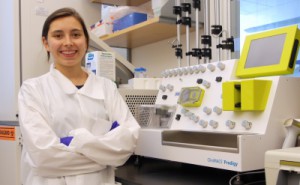20th January 2015 Boston, USA
Guest Blog: Summer at the Harvard Stem Cell Institute
It is especially rewarding for me when the collaborations created through my work impact the scientific experiences of young scientists – to me, it feels like I am doing my part to pay forward the kindnesses I was shown as a student. My first project upon joining the UK Science and Innovation Network in 2013 focused on building new collaborations within biomanufacturing, a sector where the UK has extensive research capability. As a result of the project, the EPSRC Centre for Innovative Manufacturing in Regenerative Medicine at the University of Loughborough has developed collaborative work streams with the Harvard Stem Cell Institute, including a placement for a UK student within the HSCI Summer Internship program. Interested UK participants can learn more about this year’s programme here. Elizabeth Cheeseman was the first student impacted by this new UK-US collaboration – below is the story of her time at Harvard. – Sarah H.
 Having never lived outside of Britain, I was determined to spend the summer abroad; but I never imagined that I would spend it at the Harvard Stem Cell Institute (HSCI). When I stumbled across the EPSRC Centre for Innovative Manufacturing in Regenerative Medicine fully funded internship at HSCI, I knew it would be an amazing opportunity and I began instantly working on my application.
Having never lived outside of Britain, I was determined to spend the summer abroad; but I never imagined that I would spend it at the Harvard Stem Cell Institute (HSCI). When I stumbled across the EPSRC Centre for Innovative Manufacturing in Regenerative Medicine fully funded internship at HSCI, I knew it would be an amazing opportunity and I began instantly working on my application.
At a young age I became interested in Healthcare after my Grandmother was afflicted with Chronic Kidney Disease. However I was, and still am, extremely squeamish and therefore a traditional career in Medicine would not have suited me. Science and mathematics came naturally to me and so Chemical Engineering was an obvious choice. As I progressed though my application, I knew the competition would be stiff and self-doubt set in. Now I am very glad that I persevered and submitted the application.
The first thing that struck me was how inspirational my fellow HSCI interns were. Each student was exceptionally talented and hard working. We made friends quickly and took advantage of those few, quieter weekends to explore the beautiful city of Boston. When the hard work kicked-in we supported each other and shared advice. My fellow interns had an infectious confidence which helped to banish my own self-doubt.
The summer program consisted of full time laboratory research and a series of seminars on Friday mornings. My allocated lab was with the Center for Human Cell Therapy at Boston Children’s Hospital and my project focused on labelling bone marrow stem cells with FDA approved substances; this would allow them to be tracked within the body. This lab is somewhat different to a basic facility, as it was established to translate bench work to clinical applications, and therefore it was the perfect lab for me. I was overwhelmed with the support and kindness I received from my colleges and I thoroughly enjoyed my placement.
The Friday morning seminars were an education in what I consider to be stem cells plus. We had a couple of lessons about the biology surrounding stem cells and again, as an engineer, most of which was over my head at first. That was a great because it pushed me further – what would be the point of going to Harvard to hear things I already knew? However most of our lessons focused on the plus side. The ethics behind stem cell research, its potential, its history and much more. This was the best part for me, because this stuff is discussion based. It’s not fact, it’s highly emotive and you can’t learn it from a text book. Every week we also had guest speakers who came to tell us about things that had changed their approach to science. Not only were these people esteemed in their fields, but they were genuine and fantastic speakers. Their attitudes to science has changed mine for the better.
Now my summer is over and I an officially an HSCI alumna. The last Friday of the program we held a symposium which was a celebration of our achievements that summer. I am incredibly grateful for this wonderful opportunity and for the many people who made it happen. To name but a few I would like to thank my incredible lab colleagues (Myriam Armant and friends), Willy Lensch, Bill Anderson and Maureen Hermann for a fantastic program, the amazing support I received from the Loughborough Centre for Biological Engineering and the EPSRC Centre for Innovative Manufacturing in Regenerative Medicine, my awesome housemates at MIT Student House, my loving and supportive family and esteemed HSCI colleagues. Reflecting on my experience I realise how much I have learnt in terms of biology and beyond. My most important lesson learnt was one of confidence and how to aim higher.
Elizabeth “Lizzie” Cheeseman
It sounds interesting, educative and appeals to my interest. I really wish to personally join the network of science which has been the field of my interest since my childhood. Regardless of the fact that i am not a professional scientist, my aspiration about science and technology remains high which has led to the production of excellent results by today including the introduction of a science based organization in my community called E-Science Youth Organization. Otherwise, Congratulations Elizabeth for making it.